Entrepreneurship and its Impact on the Economy
VerifiedAdded on 2023/06/11
|17
|5756
|282
AI Summary
This study explores the definition and scope of entrepreneurship, traits and characteristics associated with entrepreneurship, and the entrepreneurial mindset. It also examines the differences and similarities between public and corporate entrepreneurship, and the impact of micro and small business ventures on the economy at different levels. The study assesses the impact of SMEs on the UK economy.
Contribute Materials
Your contribution can guide someone’s learning journey. Share your
documents today.

Business
1
1
Secure Best Marks with AI Grader
Need help grading? Try our AI Grader for instant feedback on your assignments.
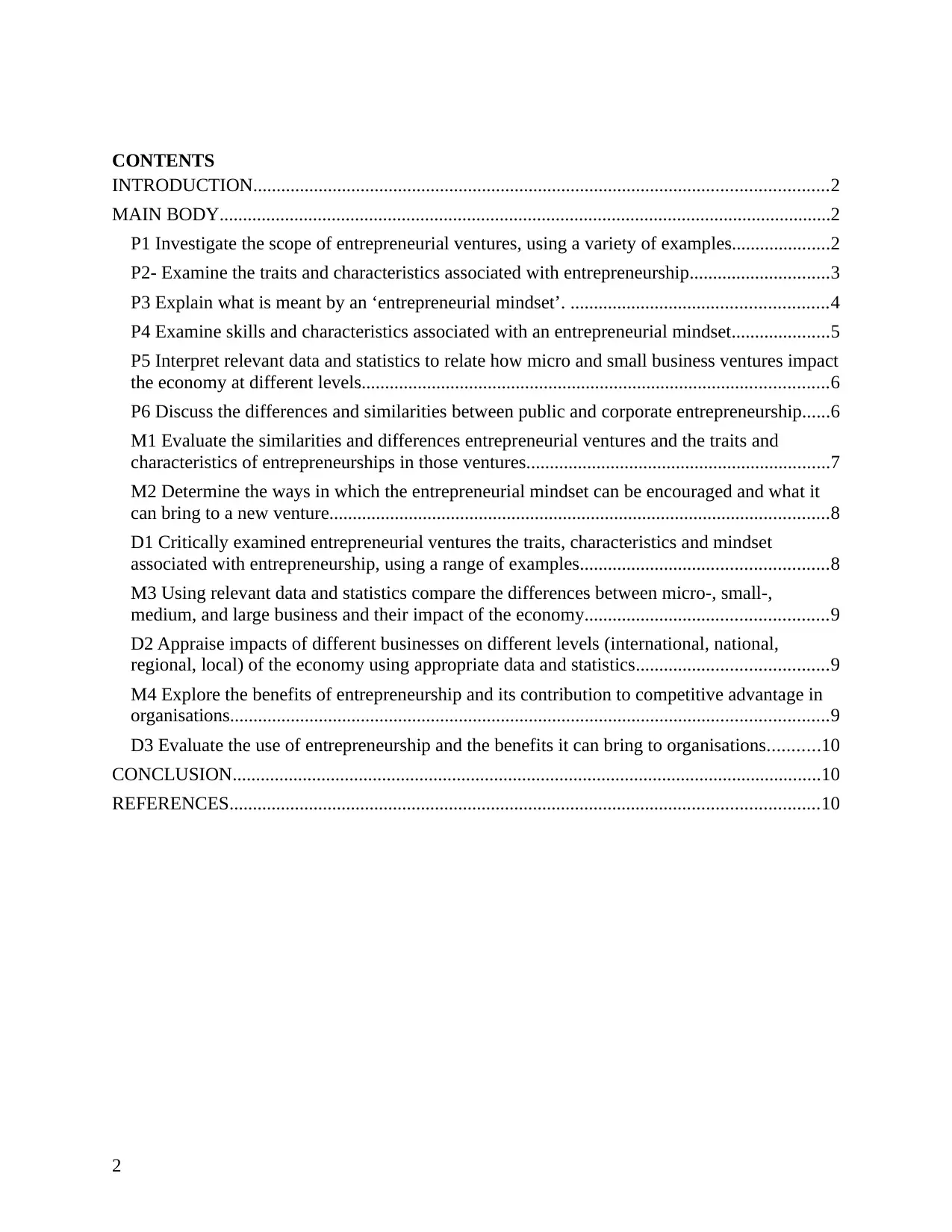
CONTENTS
INTRODUCTION...........................................................................................................................2
MAIN BODY...................................................................................................................................2
P1 Investigate the scope of entrepreneurial ventures, using a variety of examples.....................2
P2- Examine the traits and characteristics associated with entrepreneurship..............................3
P3 Explain what is meant by an ‘entrepreneurial mindset’. .......................................................4
P4 Examine skills and characteristics associated with an entrepreneurial mindset.....................5
P5 Interpret relevant data and statistics to relate how micro and small business ventures impact
the economy at different levels....................................................................................................6
P6 Discuss the differences and similarities between public and corporate entrepreneurship......6
M1 Evaluate the similarities and differences entrepreneurial ventures and the traits and
characteristics of entrepreneurships in those ventures.................................................................7
M2 Determine the ways in which the entrepreneurial mindset can be encouraged and what it
can bring to a new venture...........................................................................................................8
D1 Critically examined entrepreneurial ventures the traits, characteristics and mindset
associated with entrepreneurship, using a range of examples.....................................................8
M3 Using relevant data and statistics compare the differences between micro-, small-,
medium, and large business and their impact of the economy....................................................9
D2 Appraise impacts of different businesses on different levels (international, national,
regional, local) of the economy using appropriate data and statistics.........................................9
M4 Explore the benefits of entrepreneurship and its contribution to competitive advantage in
organisations................................................................................................................................9
D3 Evaluate the use of entrepreneurship and the benefits it can bring to organisations...........10
CONCLUSION..............................................................................................................................10
REFERENCES..............................................................................................................................10
2
INTRODUCTION...........................................................................................................................2
MAIN BODY...................................................................................................................................2
P1 Investigate the scope of entrepreneurial ventures, using a variety of examples.....................2
P2- Examine the traits and characteristics associated with entrepreneurship..............................3
P3 Explain what is meant by an ‘entrepreneurial mindset’. .......................................................4
P4 Examine skills and characteristics associated with an entrepreneurial mindset.....................5
P5 Interpret relevant data and statistics to relate how micro and small business ventures impact
the economy at different levels....................................................................................................6
P6 Discuss the differences and similarities between public and corporate entrepreneurship......6
M1 Evaluate the similarities and differences entrepreneurial ventures and the traits and
characteristics of entrepreneurships in those ventures.................................................................7
M2 Determine the ways in which the entrepreneurial mindset can be encouraged and what it
can bring to a new venture...........................................................................................................8
D1 Critically examined entrepreneurial ventures the traits, characteristics and mindset
associated with entrepreneurship, using a range of examples.....................................................8
M3 Using relevant data and statistics compare the differences between micro-, small-,
medium, and large business and their impact of the economy....................................................9
D2 Appraise impacts of different businesses on different levels (international, national,
regional, local) of the economy using appropriate data and statistics.........................................9
M4 Explore the benefits of entrepreneurship and its contribution to competitive advantage in
organisations................................................................................................................................9
D3 Evaluate the use of entrepreneurship and the benefits it can bring to organisations...........10
CONCLUSION..............................................................................................................................10
REFERENCES..............................................................................................................................10
2
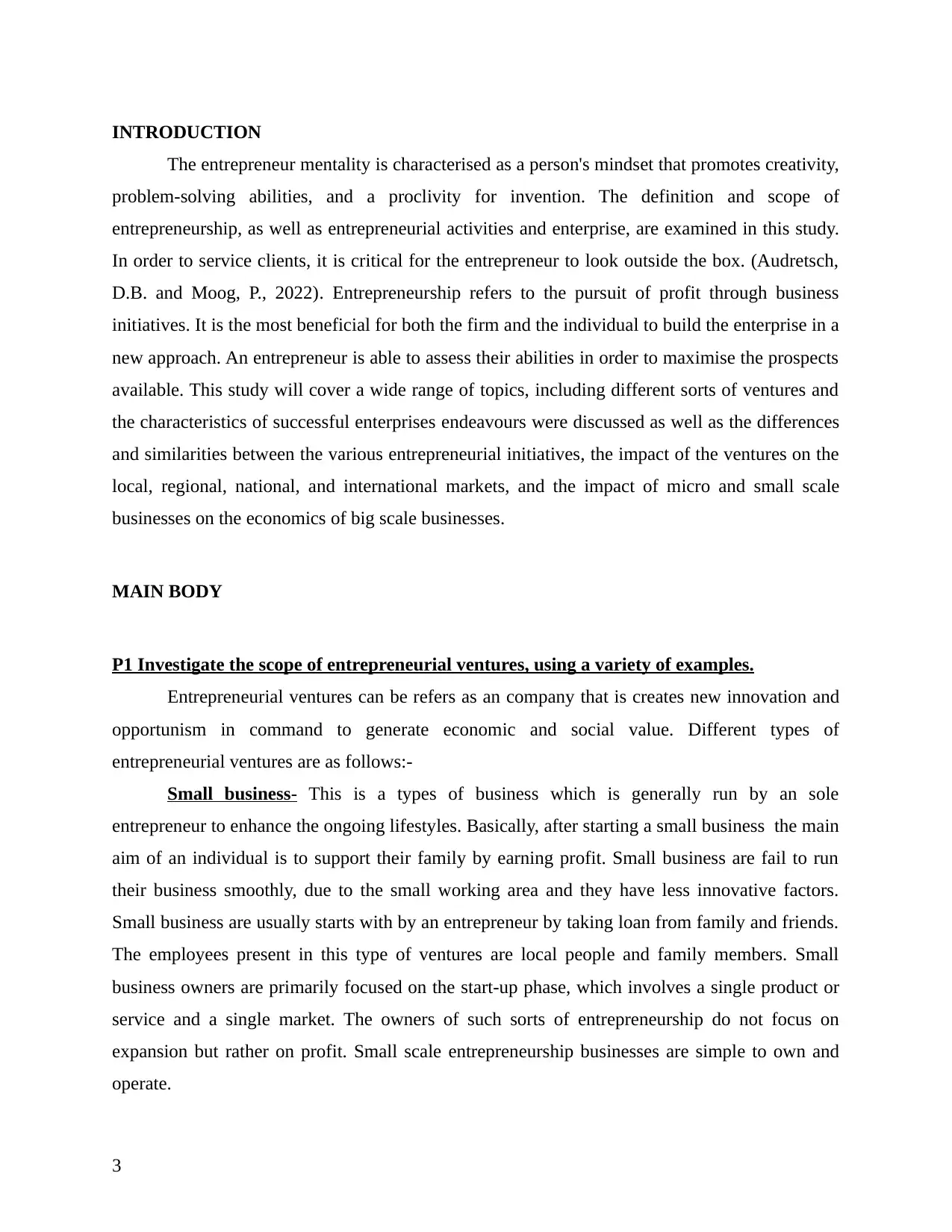
INTRODUCTION
The entrepreneur mentality is characterised as a person's mindset that promotes creativity,
problem-solving abilities, and a proclivity for invention. The definition and scope of
entrepreneurship, as well as entrepreneurial activities and enterprise, are examined in this study.
In order to service clients, it is critical for the entrepreneur to look outside the box. (Audretsch,
D.B. and Moog, P., 2022). Entrepreneurship refers to the pursuit of profit through business
initiatives. It is the most beneficial for both the firm and the individual to build the enterprise in a
new approach. An entrepreneur is able to assess their abilities in order to maximise the prospects
available. This study will cover a wide range of topics, including different sorts of ventures and
the characteristics of successful enterprises endeavours were discussed as well as the differences
and similarities between the various entrepreneurial initiatives, the impact of the ventures on the
local, regional, national, and international markets, and the impact of micro and small scale
businesses on the economics of big scale businesses.
MAIN BODY
P1 Investigate the scope of entrepreneurial ventures, using a variety of examples.
Entrepreneurial ventures can be refers as an company that is creates new innovation and
opportunism in command to generate economic and social value. Different types of
entrepreneurial ventures are as follows:-
Small business- This is a types of business which is generally run by an sole
entrepreneur to enhance the ongoing lifestyles. Basically, after starting a small business the main
aim of an individual is to support their family by earning profit. Small business are fail to run
their business smoothly, due to the small working area and they have less innovative factors.
Small business are usually starts with by an entrepreneur by taking loan from family and friends.
The employees present in this type of ventures are local people and family members. Small
business owners are primarily focused on the start-up phase, which involves a single product or
service and a single market. The owners of such sorts of entrepreneurship do not focus on
expansion but rather on profit. Small scale entrepreneurship businesses are simple to own and
operate.
3
The entrepreneur mentality is characterised as a person's mindset that promotes creativity,
problem-solving abilities, and a proclivity for invention. The definition and scope of
entrepreneurship, as well as entrepreneurial activities and enterprise, are examined in this study.
In order to service clients, it is critical for the entrepreneur to look outside the box. (Audretsch,
D.B. and Moog, P., 2022). Entrepreneurship refers to the pursuit of profit through business
initiatives. It is the most beneficial for both the firm and the individual to build the enterprise in a
new approach. An entrepreneur is able to assess their abilities in order to maximise the prospects
available. This study will cover a wide range of topics, including different sorts of ventures and
the characteristics of successful enterprises endeavours were discussed as well as the differences
and similarities between the various entrepreneurial initiatives, the impact of the ventures on the
local, regional, national, and international markets, and the impact of micro and small scale
businesses on the economics of big scale businesses.
MAIN BODY
P1 Investigate the scope of entrepreneurial ventures, using a variety of examples.
Entrepreneurial ventures can be refers as an company that is creates new innovation and
opportunism in command to generate economic and social value. Different types of
entrepreneurial ventures are as follows:-
Small business- This is a types of business which is generally run by an sole
entrepreneur to enhance the ongoing lifestyles. Basically, after starting a small business the main
aim of an individual is to support their family by earning profit. Small business are fail to run
their business smoothly, due to the small working area and they have less innovative factors.
Small business are usually starts with by an entrepreneur by taking loan from family and friends.
The employees present in this type of ventures are local people and family members. Small
business owners are primarily focused on the start-up phase, which involves a single product or
service and a single market. The owners of such sorts of entrepreneurship do not focus on
expansion but rather on profit. Small scale entrepreneurship businesses are simple to own and
operate.
3
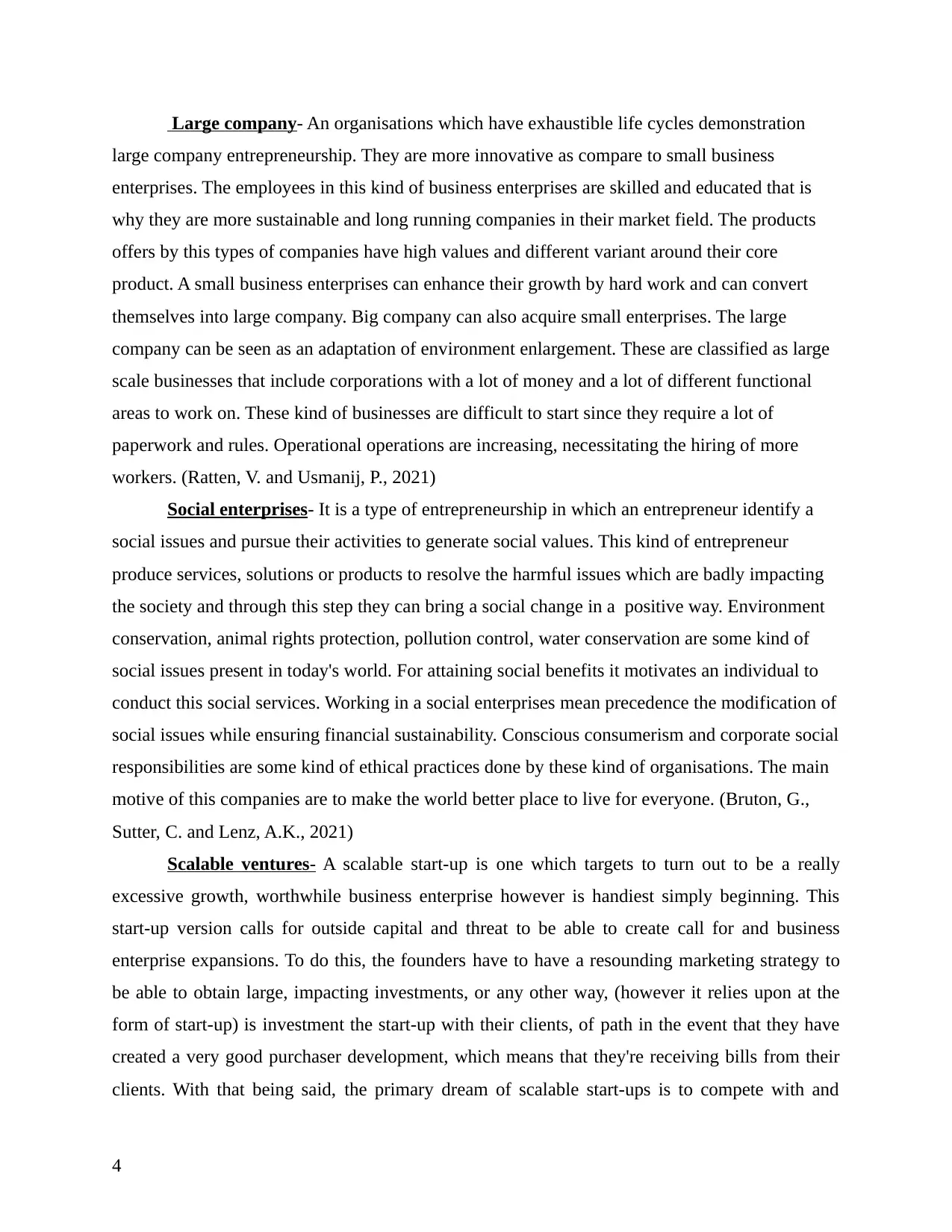
Large company- An organisations which have exhaustible life cycles demonstration
large company entrepreneurship. They are more innovative as compare to small business
enterprises. The employees in this kind of business enterprises are skilled and educated that is
why they are more sustainable and long running companies in their market field. The products
offers by this types of companies have high values and different variant around their core
product. A small business enterprises can enhance their growth by hard work and can convert
themselves into large company. Big company can also acquire small enterprises. The large
company can be seen as an adaptation of environment enlargement. These are classified as large
scale businesses that include corporations with a lot of money and a lot of different functional
areas to work on. These kind of businesses are difficult to start since they require a lot of
paperwork and rules. Operational operations are increasing, necessitating the hiring of more
workers. (Ratten, V. and Usmanij, P., 2021)
Social enterprises- It is a type of entrepreneurship in which an entrepreneur identify a
social issues and pursue their activities to generate social values. This kind of entrepreneur
produce services, solutions or products to resolve the harmful issues which are badly impacting
the society and through this step they can bring a social change in a positive way. Environment
conservation, animal rights protection, pollution control, water conservation are some kind of
social issues present in today's world. For attaining social benefits it motivates an individual to
conduct this social services. Working in a social enterprises mean precedence the modification of
social issues while ensuring financial sustainability. Conscious consumerism and corporate social
responsibilities are some kind of ethical practices done by these kind of organisations. The main
motive of this companies are to make the world better place to live for everyone. (Bruton, G.,
Sutter, C. and Lenz, A.K., 2021)
Scalable ventures- A scalable start-up is one which targets to turn out to be a really
excessive growth, worthwhile business enterprise however is handiest simply beginning. This
start-up version calls for outside capital and threat to be able to create call for and business
enterprise expansions. To do this, the founders have to have a resounding marketing strategy to
be able to obtain large, impacting investments, or any other way, (however it relies upon at the
form of start-up) is investment the start-up with their clients, of path in the event that they have
created a very good purchaser development, which means that they're receiving bills from their
clients. With that being said, the primary dream of scalable start-ups is to compete with and
4
large company entrepreneurship. They are more innovative as compare to small business
enterprises. The employees in this kind of business enterprises are skilled and educated that is
why they are more sustainable and long running companies in their market field. The products
offers by this types of companies have high values and different variant around their core
product. A small business enterprises can enhance their growth by hard work and can convert
themselves into large company. Big company can also acquire small enterprises. The large
company can be seen as an adaptation of environment enlargement. These are classified as large
scale businesses that include corporations with a lot of money and a lot of different functional
areas to work on. These kind of businesses are difficult to start since they require a lot of
paperwork and rules. Operational operations are increasing, necessitating the hiring of more
workers. (Ratten, V. and Usmanij, P., 2021)
Social enterprises- It is a type of entrepreneurship in which an entrepreneur identify a
social issues and pursue their activities to generate social values. This kind of entrepreneur
produce services, solutions or products to resolve the harmful issues which are badly impacting
the society and through this step they can bring a social change in a positive way. Environment
conservation, animal rights protection, pollution control, water conservation are some kind of
social issues present in today's world. For attaining social benefits it motivates an individual to
conduct this social services. Working in a social enterprises mean precedence the modification of
social issues while ensuring financial sustainability. Conscious consumerism and corporate social
responsibilities are some kind of ethical practices done by these kind of organisations. The main
motive of this companies are to make the world better place to live for everyone. (Bruton, G.,
Sutter, C. and Lenz, A.K., 2021)
Scalable ventures- A scalable start-up is one which targets to turn out to be a really
excessive growth, worthwhile business enterprise however is handiest simply beginning. This
start-up version calls for outside capital and threat to be able to create call for and business
enterprise expansions. To do this, the founders have to have a resounding marketing strategy to
be able to obtain large, impacting investments, or any other way, (however it relies upon at the
form of start-up) is investment the start-up with their clients, of path in the event that they have
created a very good purchaser development, which means that they're receiving bills from their
clients. With that being said, the primary dream of scalable start-ups is to compete with and
4
Secure Best Marks with AI Grader
Need help grading? Try our AI Grader for instant feedback on your assignments.
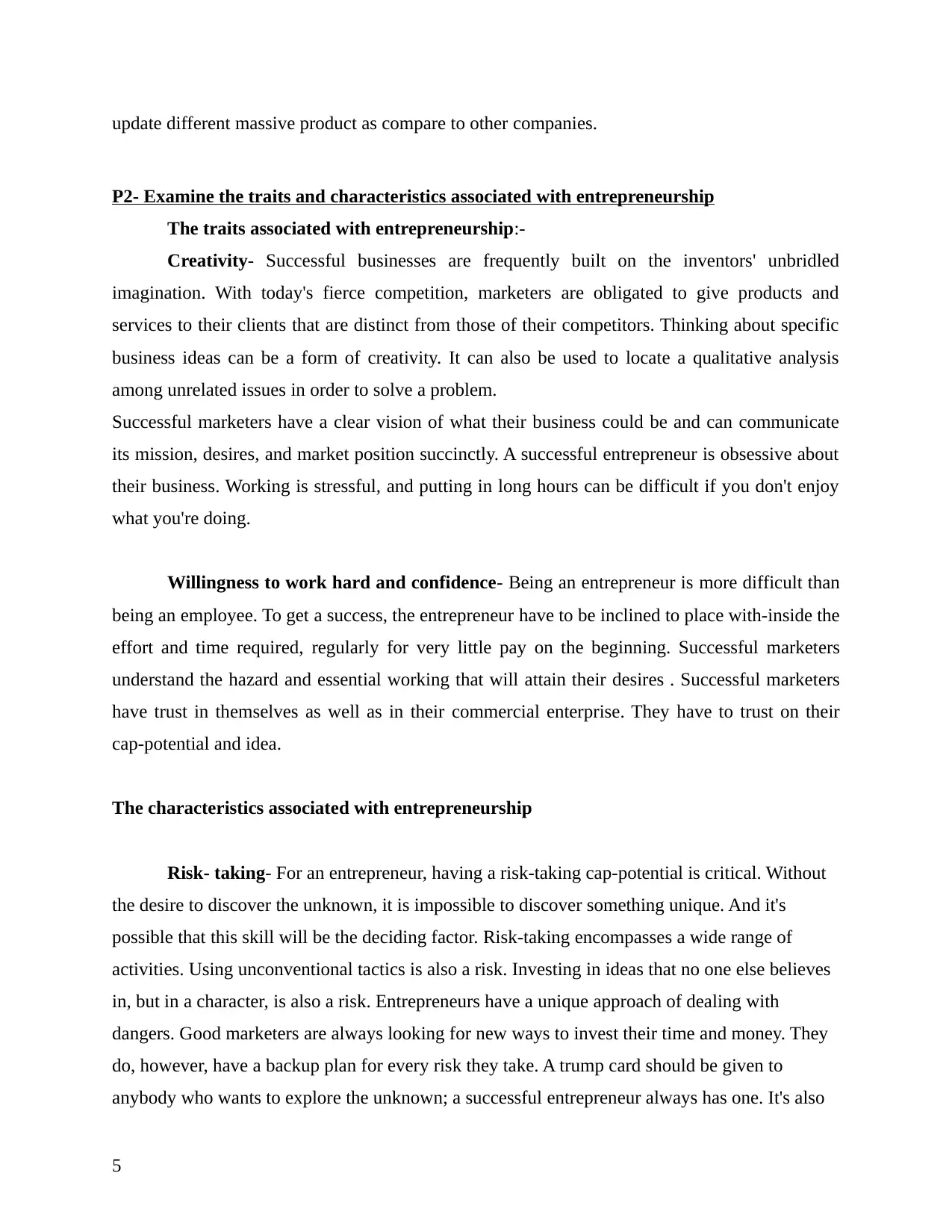
update different massive product as compare to other companies.
P2- Examine the traits and characteristics associated with entrepreneurship
The traits associated with entrepreneurship:-
Creativity- Successful businesses are frequently built on the inventors' unbridled
imagination. With today's fierce competition, marketers are obligated to give products and
services to their clients that are distinct from those of their competitors. Thinking about specific
business ideas can be a form of creativity. It can also be used to locate a qualitative analysis
among unrelated issues in order to solve a problem.
Successful marketers have a clear vision of what their business could be and can communicate
its mission, desires, and market position succinctly. A successful entrepreneur is obsessive about
their business. Working is stressful, and putting in long hours can be difficult if you don't enjoy
what you're doing.
Willingness to work hard and confidence- Being an entrepreneur is more difficult than
being an employee. To get a success, the entrepreneur have to be inclined to place with-inside the
effort and time required, regularly for very little pay on the beginning. Successful marketers
understand the hazard and essential working that will attain their desires . Successful marketers
have trust in themselves as well as in their commercial enterprise. They have to trust on their
cap-potential and idea.
The characteristics associated with entrepreneurship
Risk- taking- For an entrepreneur, having a risk-taking cap-potential is critical. Without
the desire to discover the unknown, it is impossible to discover something unique. And it's
possible that this skill will be the deciding factor. Risk-taking encompasses a wide range of
activities. Using unconventional tactics is also a risk. Investing in ideas that no one else believes
in, but in a character, is also a risk. Entrepreneurs have a unique approach of dealing with
dangers. Good marketers are always looking for new ways to invest their time and money. They
do, however, have a backup plan for every risk they take. A trump card should be given to
anybody who wants to explore the unknown; a successful entrepreneur always has one. It's also
5
P2- Examine the traits and characteristics associated with entrepreneurship
The traits associated with entrepreneurship:-
Creativity- Successful businesses are frequently built on the inventors' unbridled
imagination. With today's fierce competition, marketers are obligated to give products and
services to their clients that are distinct from those of their competitors. Thinking about specific
business ideas can be a form of creativity. It can also be used to locate a qualitative analysis
among unrelated issues in order to solve a problem.
Successful marketers have a clear vision of what their business could be and can communicate
its mission, desires, and market position succinctly. A successful entrepreneur is obsessive about
their business. Working is stressful, and putting in long hours can be difficult if you don't enjoy
what you're doing.
Willingness to work hard and confidence- Being an entrepreneur is more difficult than
being an employee. To get a success, the entrepreneur have to be inclined to place with-inside the
effort and time required, regularly for very little pay on the beginning. Successful marketers
understand the hazard and essential working that will attain their desires . Successful marketers
have trust in themselves as well as in their commercial enterprise. They have to trust on their
cap-potential and idea.
The characteristics associated with entrepreneurship
Risk- taking- For an entrepreneur, having a risk-taking cap-potential is critical. Without
the desire to discover the unknown, it is impossible to discover something unique. And it's
possible that this skill will be the deciding factor. Risk-taking encompasses a wide range of
activities. Using unconventional tactics is also a risk. Investing in ideas that no one else believes
in, but in a character, is also a risk. Entrepreneurs have a unique approach of dealing with
dangers. Good marketers are always looking for new ways to invest their time and money. They
do, however, have a backup plan for every risk they take. A trump card should be given to
anybody who wants to explore the unknown; a successful entrepreneur always has one. It's also
5
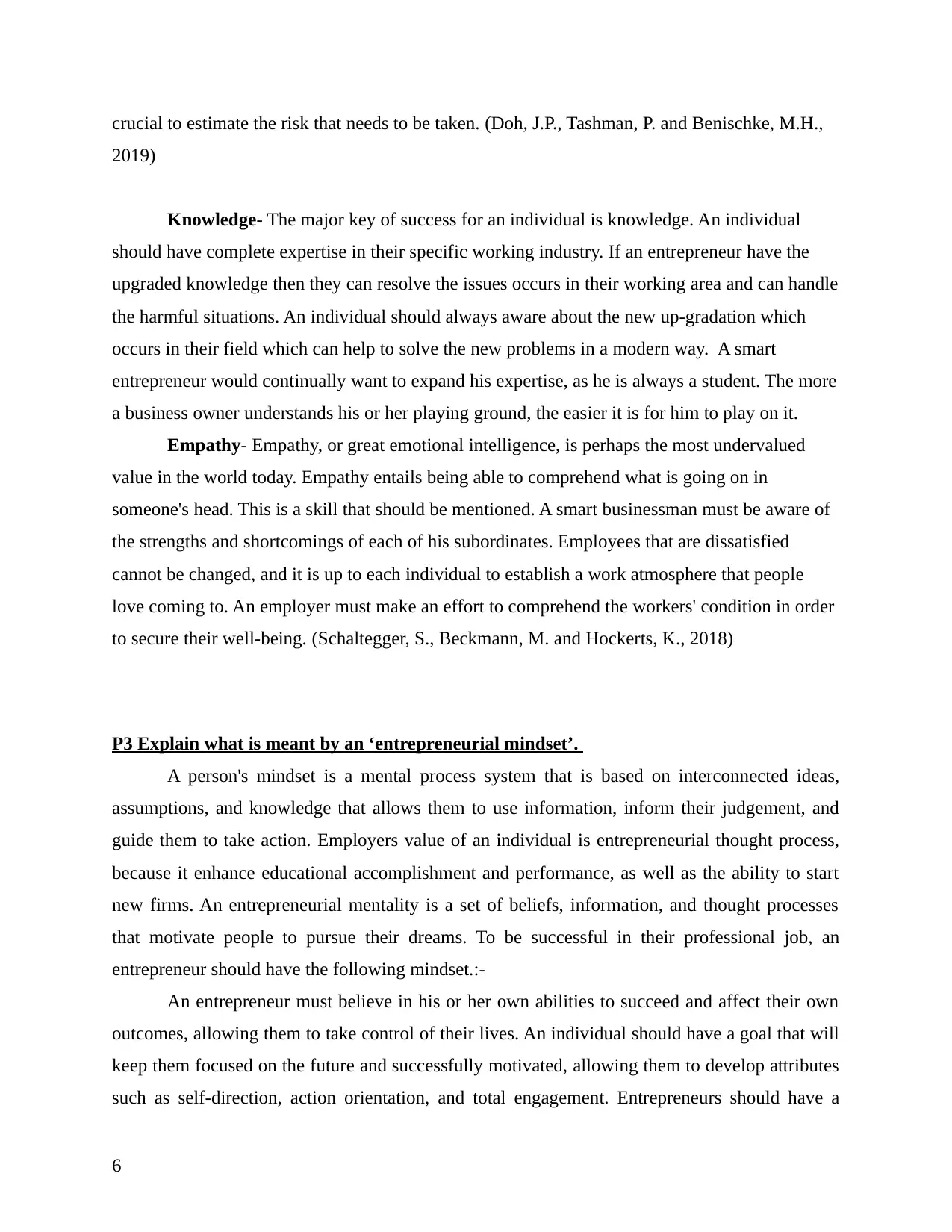
crucial to estimate the risk that needs to be taken. (Doh, J.P., Tashman, P. and Benischke, M.H.,
2019)
Knowledge- The major key of success for an individual is knowledge. An individual
should have complete expertise in their specific working industry. If an entrepreneur have the
upgraded knowledge then they can resolve the issues occurs in their working area and can handle
the harmful situations. An individual should always aware about the new up-gradation which
occurs in their field which can help to solve the new problems in a modern way. A smart
entrepreneur would continually want to expand his expertise, as he is always a student. The more
a business owner understands his or her playing ground, the easier it is for him to play on it.
Empathy- Empathy, or great emotional intelligence, is perhaps the most undervalued
value in the world today. Empathy entails being able to comprehend what is going on in
someone's head. This is a skill that should be mentioned. A smart businessman must be aware of
the strengths and shortcomings of each of his subordinates. Employees that are dissatisfied
cannot be changed, and it is up to each individual to establish a work atmosphere that people
love coming to. An employer must make an effort to comprehend the workers' condition in order
to secure their well-being. (Schaltegger, S., Beckmann, M. and Hockerts, K., 2018)
P3 Explain what is meant by an ‘entrepreneurial mindset’.
A person's mindset is a mental process system that is based on interconnected ideas,
assumptions, and knowledge that allows them to use information, inform their judgement, and
guide them to take action. Employers value of an individual is entrepreneurial thought process,
because it enhance educational accomplishment and performance, as well as the ability to start
new firms. An entrepreneurial mentality is a set of beliefs, information, and thought processes
that motivate people to pursue their dreams. To be successful in their professional job, an
entrepreneur should have the following mindset.:-
An entrepreneur must believe in his or her own abilities to succeed and affect their own
outcomes, allowing them to take control of their lives. An individual should have a goal that will
keep them focused on the future and successfully motivated, allowing them to develop attributes
such as self-direction, action orientation, and total engagement. Entrepreneurs should have a
6
2019)
Knowledge- The major key of success for an individual is knowledge. An individual
should have complete expertise in their specific working industry. If an entrepreneur have the
upgraded knowledge then they can resolve the issues occurs in their working area and can handle
the harmful situations. An individual should always aware about the new up-gradation which
occurs in their field which can help to solve the new problems in a modern way. A smart
entrepreneur would continually want to expand his expertise, as he is always a student. The more
a business owner understands his or her playing ground, the easier it is for him to play on it.
Empathy- Empathy, or great emotional intelligence, is perhaps the most undervalued
value in the world today. Empathy entails being able to comprehend what is going on in
someone's head. This is a skill that should be mentioned. A smart businessman must be aware of
the strengths and shortcomings of each of his subordinates. Employees that are dissatisfied
cannot be changed, and it is up to each individual to establish a work atmosphere that people
love coming to. An employer must make an effort to comprehend the workers' condition in order
to secure their well-being. (Schaltegger, S., Beckmann, M. and Hockerts, K., 2018)
P3 Explain what is meant by an ‘entrepreneurial mindset’.
A person's mindset is a mental process system that is based on interconnected ideas,
assumptions, and knowledge that allows them to use information, inform their judgement, and
guide them to take action. Employers value of an individual is entrepreneurial thought process,
because it enhance educational accomplishment and performance, as well as the ability to start
new firms. An entrepreneurial mentality is a set of beliefs, information, and thought processes
that motivate people to pursue their dreams. To be successful in their professional job, an
entrepreneur should have the following mindset.:-
An entrepreneur must believe in his or her own abilities to succeed and affect their own
outcomes, allowing them to take control of their lives. An individual should have a goal that will
keep them focused on the future and successfully motivated, allowing them to develop attributes
such as self-direction, action orientation, and total engagement. Entrepreneurs should have a
6
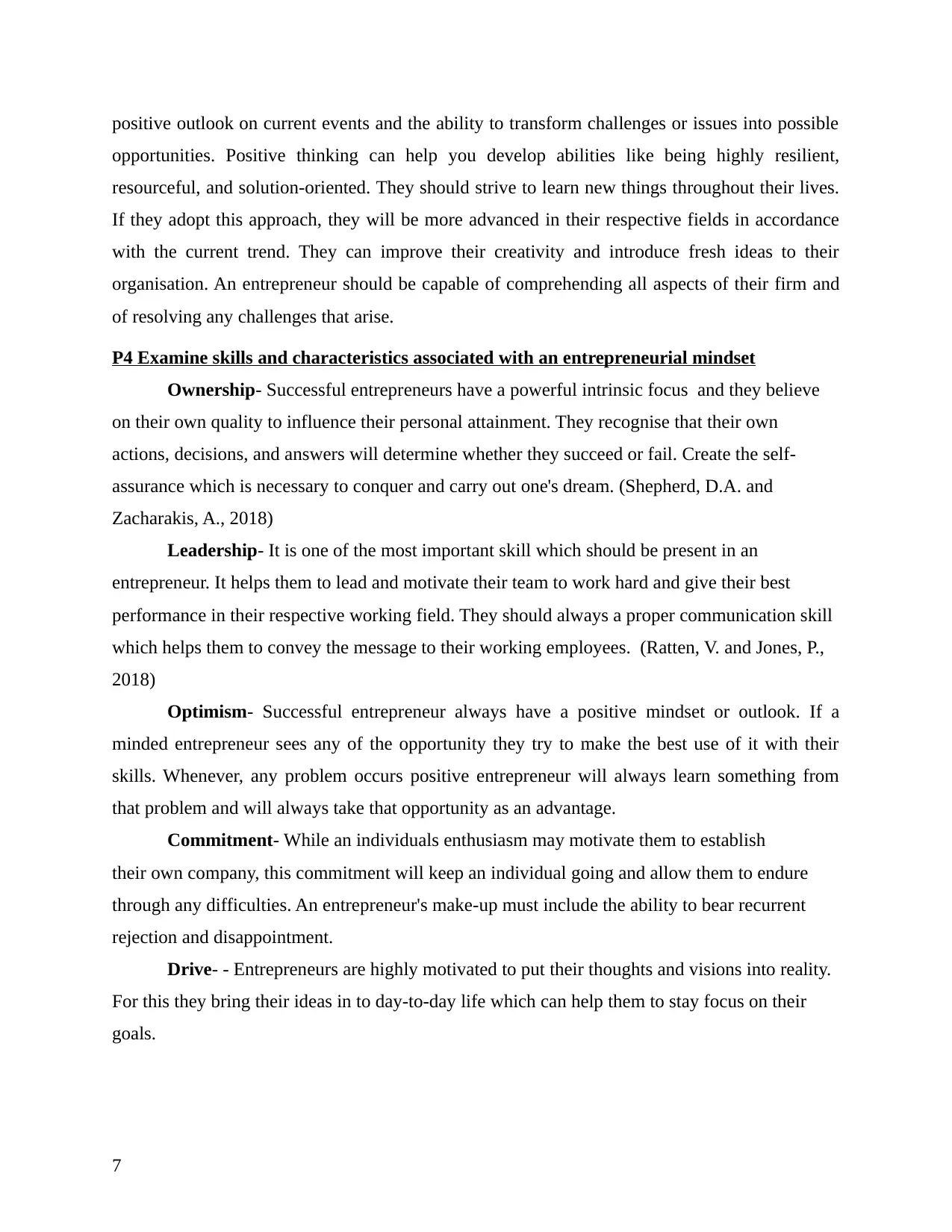
positive outlook on current events and the ability to transform challenges or issues into possible
opportunities. Positive thinking can help you develop abilities like being highly resilient,
resourceful, and solution-oriented. They should strive to learn new things throughout their lives.
If they adopt this approach, they will be more advanced in their respective fields in accordance
with the current trend. They can improve their creativity and introduce fresh ideas to their
organisation. An entrepreneur should be capable of comprehending all aspects of their firm and
of resolving any challenges that arise.
P4 Examine skills and characteristics associated with an entrepreneurial mindset
Ownership- Successful entrepreneurs have a powerful intrinsic focus and they believe
on their own quality to influence their personal attainment. They recognise that their own
actions, decisions, and answers will determine whether they succeed or fail. Create the self-
assurance which is necessary to conquer and carry out one's dream. (Shepherd, D.A. and
Zacharakis, A., 2018)
Leadership- It is one of the most important skill which should be present in an
entrepreneur. It helps them to lead and motivate their team to work hard and give their best
performance in their respective working field. They should always a proper communication skill
which helps them to convey the message to their working employees. (Ratten, V. and Jones, P.,
2018)
Optimism- Successful entrepreneur always have a positive mindset or outlook. If a
minded entrepreneur sees any of the opportunity they try to make the best use of it with their
skills. Whenever, any problem occurs positive entrepreneur will always learn something from
that problem and will always take that opportunity as an advantage.
Commitment- While an individuals enthusiasm may motivate them to establish
their own company, this commitment will keep an individual going and allow them to endure
through any difficulties. An entrepreneur's make-up must include the ability to bear recurrent
rejection and disappointment.
Drive- - Entrepreneurs are highly motivated to put their thoughts and visions into reality.
For this they bring their ideas in to day-to-day life which can help them to stay focus on their
goals.
7
opportunities. Positive thinking can help you develop abilities like being highly resilient,
resourceful, and solution-oriented. They should strive to learn new things throughout their lives.
If they adopt this approach, they will be more advanced in their respective fields in accordance
with the current trend. They can improve their creativity and introduce fresh ideas to their
organisation. An entrepreneur should be capable of comprehending all aspects of their firm and
of resolving any challenges that arise.
P4 Examine skills and characteristics associated with an entrepreneurial mindset
Ownership- Successful entrepreneurs have a powerful intrinsic focus and they believe
on their own quality to influence their personal attainment. They recognise that their own
actions, decisions, and answers will determine whether they succeed or fail. Create the self-
assurance which is necessary to conquer and carry out one's dream. (Shepherd, D.A. and
Zacharakis, A., 2018)
Leadership- It is one of the most important skill which should be present in an
entrepreneur. It helps them to lead and motivate their team to work hard and give their best
performance in their respective working field. They should always a proper communication skill
which helps them to convey the message to their working employees. (Ratten, V. and Jones, P.,
2018)
Optimism- Successful entrepreneur always have a positive mindset or outlook. If a
minded entrepreneur sees any of the opportunity they try to make the best use of it with their
skills. Whenever, any problem occurs positive entrepreneur will always learn something from
that problem and will always take that opportunity as an advantage.
Commitment- While an individuals enthusiasm may motivate them to establish
their own company, this commitment will keep an individual going and allow them to endure
through any difficulties. An entrepreneur's make-up must include the ability to bear recurrent
rejection and disappointment.
Drive- - Entrepreneurs are highly motivated to put their thoughts and visions into reality.
For this they bring their ideas in to day-to-day life which can help them to stay focus on their
goals.
7
Paraphrase This Document
Need a fresh take? Get an instant paraphrase of this document with our AI Paraphraser

LO3 Assess the impact of SMEs (small medium enterprises) on the economy
Define SMEs
The term SME is defined as a small business with approximately 250 employees. In the
UK context, a company with sales of less than € 50 million or a balance sheet of less than € 43
million is classified as a SME. Both types of organizations, such as small and medium-sized
enterprises and large enterprises, have been found to have a tremendous impact on the economy
at various levels that need to be considered. All types of trading companies are being studied to
influence a variety of factors that need to be managed.
SME'S impact on the UK economy.
If an organization has less than 6 employees, it is classified as micro because they are
known to contribute to a variety of factors that drive economic development and growth.
At the start of 2021 there were 5.5 million small businesses (with 0 to 49 employees),
99.2% of the total business. SMEs account for 99.9% of the business population
(5.5 million businesses).
SMEs account for three fifths of the employment and around half of turnover in the UK
private sector.
Total employment in SMEs was 16.3 million (61% of the total), whilst turnover was
estimated at £2.3 trillion (52%).
Employment in small businesses (with 0 to 49 employees) was 12.9 million (48% of the
total), with a turnover of £1.6 trillion (36%).
The impact of SME'S on various economic levels are mentioned below:-
Local level- micro and SMEs can help create employment opportunities as they can
create jobs for locals living in their respective countries. It has been studied that the
impact of small businesses is that there are different ways for people to enter these types
of large enterprise organizations. This encourages people in that particular area to identify
various opportunities, such as work, that can help them earn more.
National level- SMEs help the development of society by establishing various ventures,
and as a result, generate more income at the national level. SME growth strengthens the
various sectors in the region in which the company operates.
Regional level- Economic development will result from increased employment
opportunities, which will affect the organization of businesses at the regional level and
promote their further growth.(Prashantham and Birkinshaw, 2022).
Internationally- The increase in international market opportunities that are affecting the
international economy through SMEs has a significant impact on business ventures.
Innovations and modifications made by small and large industries enable international
growth. Small-scale business are one of the leading players in the development of
economic growth around the world.
Appraise impacts of different businesses on different levels (international, national,
regional, local) of the economy using appropriate
Local level- It is identified that the impact over the local level is that there is the
opportunities for the people to enter within the business organisation. This can create
more job opportunities foe the people of the nation.
8
Define SMEs
The term SME is defined as a small business with approximately 250 employees. In the
UK context, a company with sales of less than € 50 million or a balance sheet of less than € 43
million is classified as a SME. Both types of organizations, such as small and medium-sized
enterprises and large enterprises, have been found to have a tremendous impact on the economy
at various levels that need to be considered. All types of trading companies are being studied to
influence a variety of factors that need to be managed.
SME'S impact on the UK economy.
If an organization has less than 6 employees, it is classified as micro because they are
known to contribute to a variety of factors that drive economic development and growth.
At the start of 2021 there were 5.5 million small businesses (with 0 to 49 employees),
99.2% of the total business. SMEs account for 99.9% of the business population
(5.5 million businesses).
SMEs account for three fifths of the employment and around half of turnover in the UK
private sector.
Total employment in SMEs was 16.3 million (61% of the total), whilst turnover was
estimated at £2.3 trillion (52%).
Employment in small businesses (with 0 to 49 employees) was 12.9 million (48% of the
total), with a turnover of £1.6 trillion (36%).
The impact of SME'S on various economic levels are mentioned below:-
Local level- micro and SMEs can help create employment opportunities as they can
create jobs for locals living in their respective countries. It has been studied that the
impact of small businesses is that there are different ways for people to enter these types
of large enterprise organizations. This encourages people in that particular area to identify
various opportunities, such as work, that can help them earn more.
National level- SMEs help the development of society by establishing various ventures,
and as a result, generate more income at the national level. SME growth strengthens the
various sectors in the region in which the company operates.
Regional level- Economic development will result from increased employment
opportunities, which will affect the organization of businesses at the regional level and
promote their further growth.(Prashantham and Birkinshaw, 2022).
Internationally- The increase in international market opportunities that are affecting the
international economy through SMEs has a significant impact on business ventures.
Innovations and modifications made by small and large industries enable international
growth. Small-scale business are one of the leading players in the development of
economic growth around the world.
Appraise impacts of different businesses on different levels (international, national,
regional, local) of the economy using appropriate
Local level- It is identified that the impact over the local level is that there is the
opportunities for the people to enter within the business organisation. This can create
more job opportunities foe the people of the nation.
8
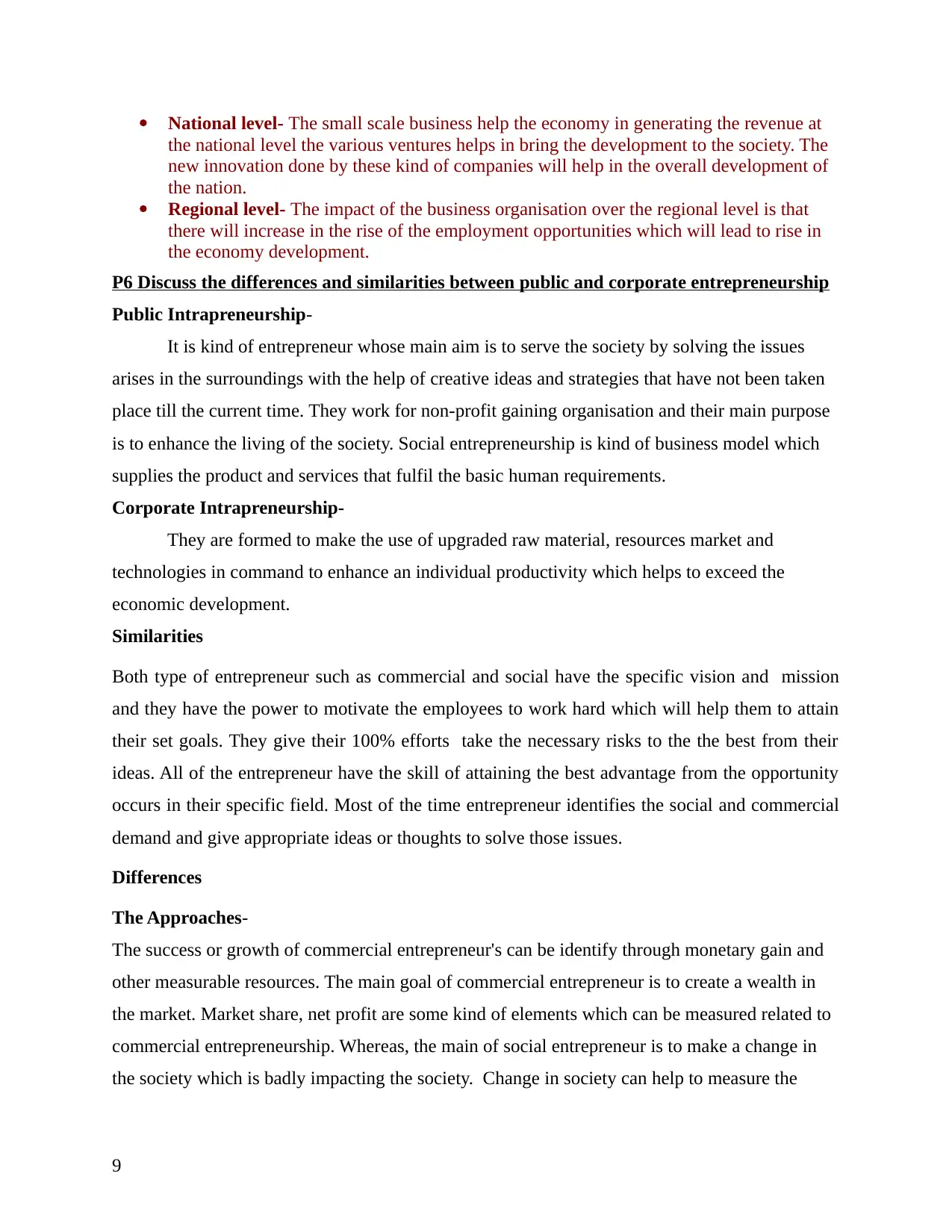
National level- The small scale business help the economy in generating the revenue at
the national level the various ventures helps in bring the development to the society. The
new innovation done by these kind of companies will help in the overall development of
the nation.
Regional level- The impact of the business organisation over the regional level is that
there will increase in the rise of the employment opportunities which will lead to rise in
the economy development.
P6 Discuss the differences and similarities between public and corporate entrepreneurship
Public Intrapreneurship-
It is kind of entrepreneur whose main aim is to serve the society by solving the issues
arises in the surroundings with the help of creative ideas and strategies that have not been taken
place till the current time. They work for non-profit gaining organisation and their main purpose
is to enhance the living of the society. Social entrepreneurship is kind of business model which
supplies the product and services that fulfil the basic human requirements.
Corporate Intrapreneurship-
They are formed to make the use of upgraded raw material, resources market and
technologies in command to enhance an individual productivity which helps to exceed the
economic development.
Similarities
Both type of entrepreneur such as commercial and social have the specific vision and mission
and they have the power to motivate the employees to work hard which will help them to attain
their set goals. They give their 100% efforts take the necessary risks to the the best from their
ideas. All of the entrepreneur have the skill of attaining the best advantage from the opportunity
occurs in their specific field. Most of the time entrepreneur identifies the social and commercial
demand and give appropriate ideas or thoughts to solve those issues.
Differences
The Approaches-
The success or growth of commercial entrepreneur's can be identify through monetary gain and
other measurable resources. The main goal of commercial entrepreneur is to create a wealth in
the market. Market share, net profit are some kind of elements which can be measured related to
commercial entrepreneurship. Whereas, the main of social entrepreneur is to make a change in
the society which is badly impacting the society. Change in society can help to measure the
9
the national level the various ventures helps in bring the development to the society. The
new innovation done by these kind of companies will help in the overall development of
the nation.
Regional level- The impact of the business organisation over the regional level is that
there will increase in the rise of the employment opportunities which will lead to rise in
the economy development.
P6 Discuss the differences and similarities between public and corporate entrepreneurship
Public Intrapreneurship-
It is kind of entrepreneur whose main aim is to serve the society by solving the issues
arises in the surroundings with the help of creative ideas and strategies that have not been taken
place till the current time. They work for non-profit gaining organisation and their main purpose
is to enhance the living of the society. Social entrepreneurship is kind of business model which
supplies the product and services that fulfil the basic human requirements.
Corporate Intrapreneurship-
They are formed to make the use of upgraded raw material, resources market and
technologies in command to enhance an individual productivity which helps to exceed the
economic development.
Similarities
Both type of entrepreneur such as commercial and social have the specific vision and mission
and they have the power to motivate the employees to work hard which will help them to attain
their set goals. They give their 100% efforts take the necessary risks to the the best from their
ideas. All of the entrepreneur have the skill of attaining the best advantage from the opportunity
occurs in their specific field. Most of the time entrepreneur identifies the social and commercial
demand and give appropriate ideas or thoughts to solve those issues.
Differences
The Approaches-
The success or growth of commercial entrepreneur's can be identify through monetary gain and
other measurable resources. The main goal of commercial entrepreneur is to create a wealth in
the market. Market share, net profit are some kind of elements which can be measured related to
commercial entrepreneurship. Whereas, the main of social entrepreneur is to make a change in
the society which is badly impacting the society. Change in society can help to measure the
9
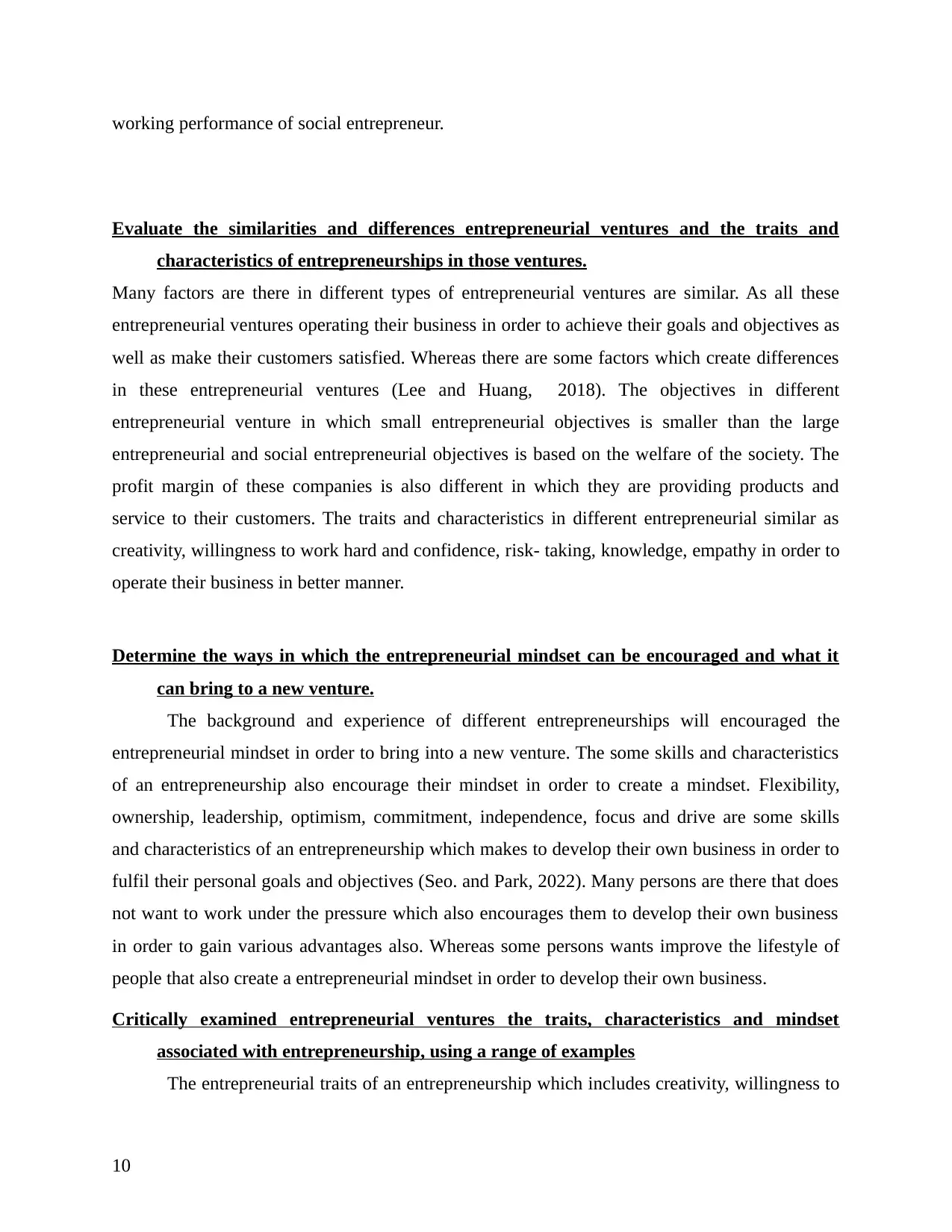
working performance of social entrepreneur.
Evaluate the similarities and differences entrepreneurial ventures and the traits and
characteristics of entrepreneurships in those ventures.
Many factors are there in different types of entrepreneurial ventures are similar. As all these
entrepreneurial ventures operating their business in order to achieve their goals and objectives as
well as make their customers satisfied. Whereas there are some factors which create differences
in these entrepreneurial ventures (Lee and Huang, 2018). The objectives in different
entrepreneurial venture in which small entrepreneurial objectives is smaller than the large
entrepreneurial and social entrepreneurial objectives is based on the welfare of the society. The
profit margin of these companies is also different in which they are providing products and
service to their customers. The traits and characteristics in different entrepreneurial similar as
creativity, willingness to work hard and confidence, risk- taking, knowledge, empathy in order to
operate their business in better manner.
Determine the ways in which the entrepreneurial mindset can be encouraged and what it
can bring to a new venture.
The background and experience of different entrepreneurships will encouraged the
entrepreneurial mindset in order to bring into a new venture. The some skills and characteristics
of an entrepreneurship also encourage their mindset in order to create a mindset. Flexibility,
ownership, leadership, optimism, commitment, independence, focus and drive are some skills
and characteristics of an entrepreneurship which makes to develop their own business in order to
fulfil their personal goals and objectives (Seo. and Park, 2022). Many persons are there that does
not want to work under the pressure which also encourages them to develop their own business
in order to gain various advantages also. Whereas some persons wants improve the lifestyle of
people that also create a entrepreneurial mindset in order to develop their own business.
Critically examined entrepreneurial ventures the traits, characteristics and mindset
associated with entrepreneurship, using a range of examples
The entrepreneurial traits of an entrepreneurship which includes creativity, willingness to
10
Evaluate the similarities and differences entrepreneurial ventures and the traits and
characteristics of entrepreneurships in those ventures.
Many factors are there in different types of entrepreneurial ventures are similar. As all these
entrepreneurial ventures operating their business in order to achieve their goals and objectives as
well as make their customers satisfied. Whereas there are some factors which create differences
in these entrepreneurial ventures (Lee and Huang, 2018). The objectives in different
entrepreneurial venture in which small entrepreneurial objectives is smaller than the large
entrepreneurial and social entrepreneurial objectives is based on the welfare of the society. The
profit margin of these companies is also different in which they are providing products and
service to their customers. The traits and characteristics in different entrepreneurial similar as
creativity, willingness to work hard and confidence, risk- taking, knowledge, empathy in order to
operate their business in better manner.
Determine the ways in which the entrepreneurial mindset can be encouraged and what it
can bring to a new venture.
The background and experience of different entrepreneurships will encouraged the
entrepreneurial mindset in order to bring into a new venture. The some skills and characteristics
of an entrepreneurship also encourage their mindset in order to create a mindset. Flexibility,
ownership, leadership, optimism, commitment, independence, focus and drive are some skills
and characteristics of an entrepreneurship which makes to develop their own business in order to
fulfil their personal goals and objectives (Seo. and Park, 2022). Many persons are there that does
not want to work under the pressure which also encourages them to develop their own business
in order to gain various advantages also. Whereas some persons wants improve the lifestyle of
people that also create a entrepreneurial mindset in order to develop their own business.
Critically examined entrepreneurial ventures the traits, characteristics and mindset
associated with entrepreneurship, using a range of examples
The entrepreneurial traits of an entrepreneurship which includes creativity, willingness to
10
Secure Best Marks with AI Grader
Need help grading? Try our AI Grader for instant feedback on your assignments.
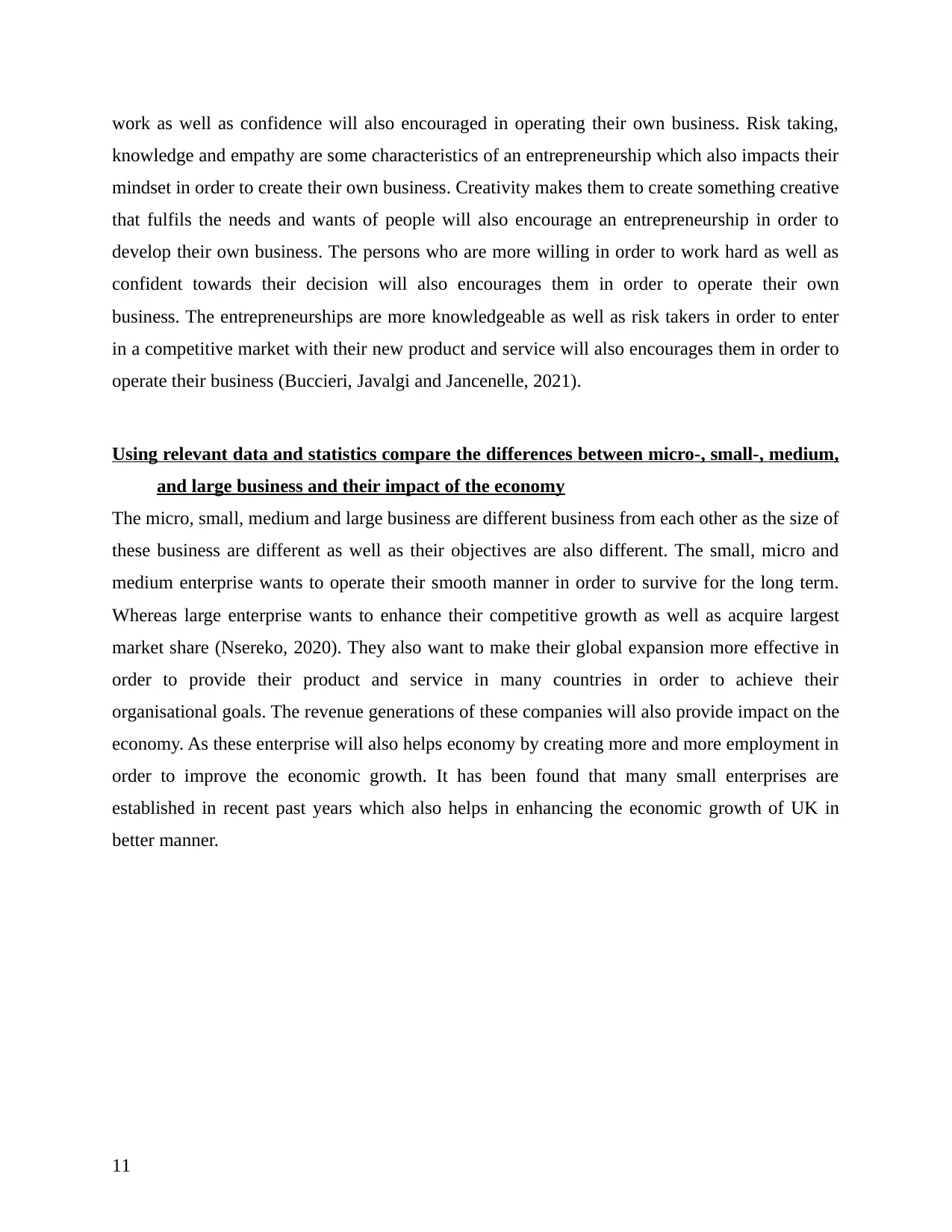
work as well as confidence will also encouraged in operating their own business. Risk taking,
knowledge and empathy are some characteristics of an entrepreneurship which also impacts their
mindset in order to create their own business. Creativity makes them to create something creative
that fulfils the needs and wants of people will also encourage an entrepreneurship in order to
develop their own business. The persons who are more willing in order to work hard as well as
confident towards their decision will also encourages them in order to operate their own
business. The entrepreneurships are more knowledgeable as well as risk takers in order to enter
in a competitive market with their new product and service will also encourages them in order to
operate their business (Buccieri, Javalgi and Jancenelle, 2021).
Using relevant data and statistics compare the differences between micro-, small-, medium,
and large business and their impact of the economy
The micro, small, medium and large business are different business from each other as the size of
these business are different as well as their objectives are also different. The small, micro and
medium enterprise wants to operate their smooth manner in order to survive for the long term.
Whereas large enterprise wants to enhance their competitive growth as well as acquire largest
market share (Nsereko, 2020). They also want to make their global expansion more effective in
order to provide their product and service in many countries in order to achieve their
organisational goals. The revenue generations of these companies will also provide impact on the
economy. As these enterprise will also helps economy by creating more and more employment in
order to improve the economic growth. It has been found that many small enterprises are
established in recent past years which also helps in enhancing the economic growth of UK in
better manner.
11
knowledge and empathy are some characteristics of an entrepreneurship which also impacts their
mindset in order to create their own business. Creativity makes them to create something creative
that fulfils the needs and wants of people will also encourage an entrepreneurship in order to
develop their own business. The persons who are more willing in order to work hard as well as
confident towards their decision will also encourages them in order to operate their own
business. The entrepreneurships are more knowledgeable as well as risk takers in order to enter
in a competitive market with their new product and service will also encourages them in order to
operate their business (Buccieri, Javalgi and Jancenelle, 2021).
Using relevant data and statistics compare the differences between micro-, small-, medium,
and large business and their impact of the economy
The micro, small, medium and large business are different business from each other as the size of
these business are different as well as their objectives are also different. The small, micro and
medium enterprise wants to operate their smooth manner in order to survive for the long term.
Whereas large enterprise wants to enhance their competitive growth as well as acquire largest
market share (Nsereko, 2020). They also want to make their global expansion more effective in
order to provide their product and service in many countries in order to achieve their
organisational goals. The revenue generations of these companies will also provide impact on the
economy. As these enterprise will also helps economy by creating more and more employment in
order to improve the economic growth. It has been found that many small enterprises are
established in recent past years which also helps in enhancing the economic growth of UK in
better manner.
11
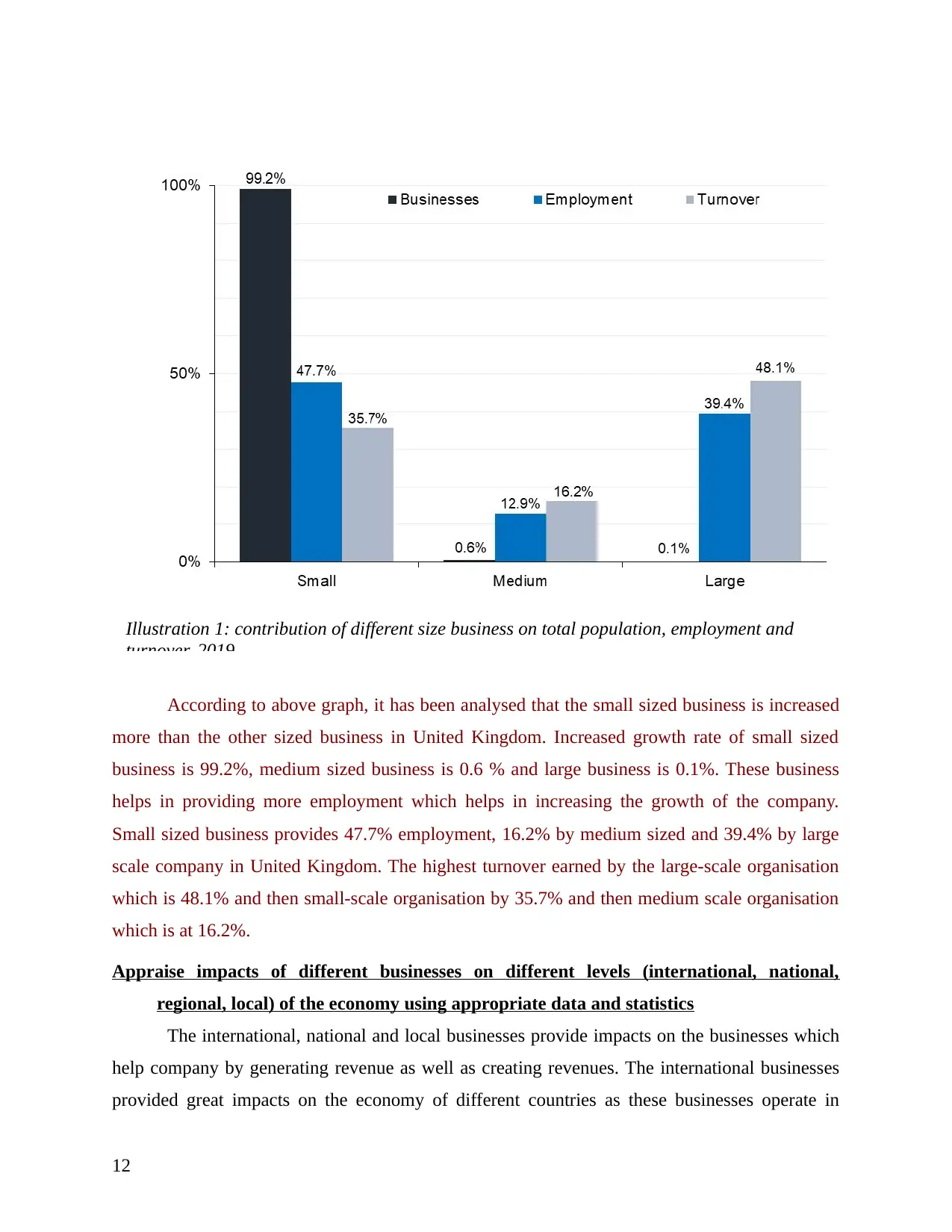
According to above graph, it has been analysed that the small sized business is increased
more than the other sized business in United Kingdom. Increased growth rate of small sized
business is 99.2%, medium sized business is 0.6 % and large business is 0.1%. These business
helps in providing more employment which helps in increasing the growth of the company.
Small sized business provides 47.7% employment, 16.2% by medium sized and 39.4% by large
scale company in United Kingdom. The highest turnover earned by the large-scale organisation
which is 48.1% and then small-scale organisation by 35.7% and then medium scale organisation
which is at 16.2%.
Appraise impacts of different businesses on different levels (international, national,
regional, local) of the economy using appropriate data and statistics
The international, national and local businesses provide impacts on the businesses which
help company by generating revenue as well as creating revenues. The international businesses
provided great impacts on the economy of different countries as these businesses operate in
12
Illustration 1: contribution of different size business on total population, employment and
turnover, 2019
more than the other sized business in United Kingdom. Increased growth rate of small sized
business is 99.2%, medium sized business is 0.6 % and large business is 0.1%. These business
helps in providing more employment which helps in increasing the growth of the company.
Small sized business provides 47.7% employment, 16.2% by medium sized and 39.4% by large
scale company in United Kingdom. The highest turnover earned by the large-scale organisation
which is 48.1% and then small-scale organisation by 35.7% and then medium scale organisation
which is at 16.2%.
Appraise impacts of different businesses on different levels (international, national,
regional, local) of the economy using appropriate data and statistics
The international, national and local businesses provide impacts on the businesses which
help company by generating revenue as well as creating revenues. The international businesses
provided great impacts on the economy of different countries as these businesses operate in
12
Illustration 1: contribution of different size business on total population, employment and
turnover, 2019
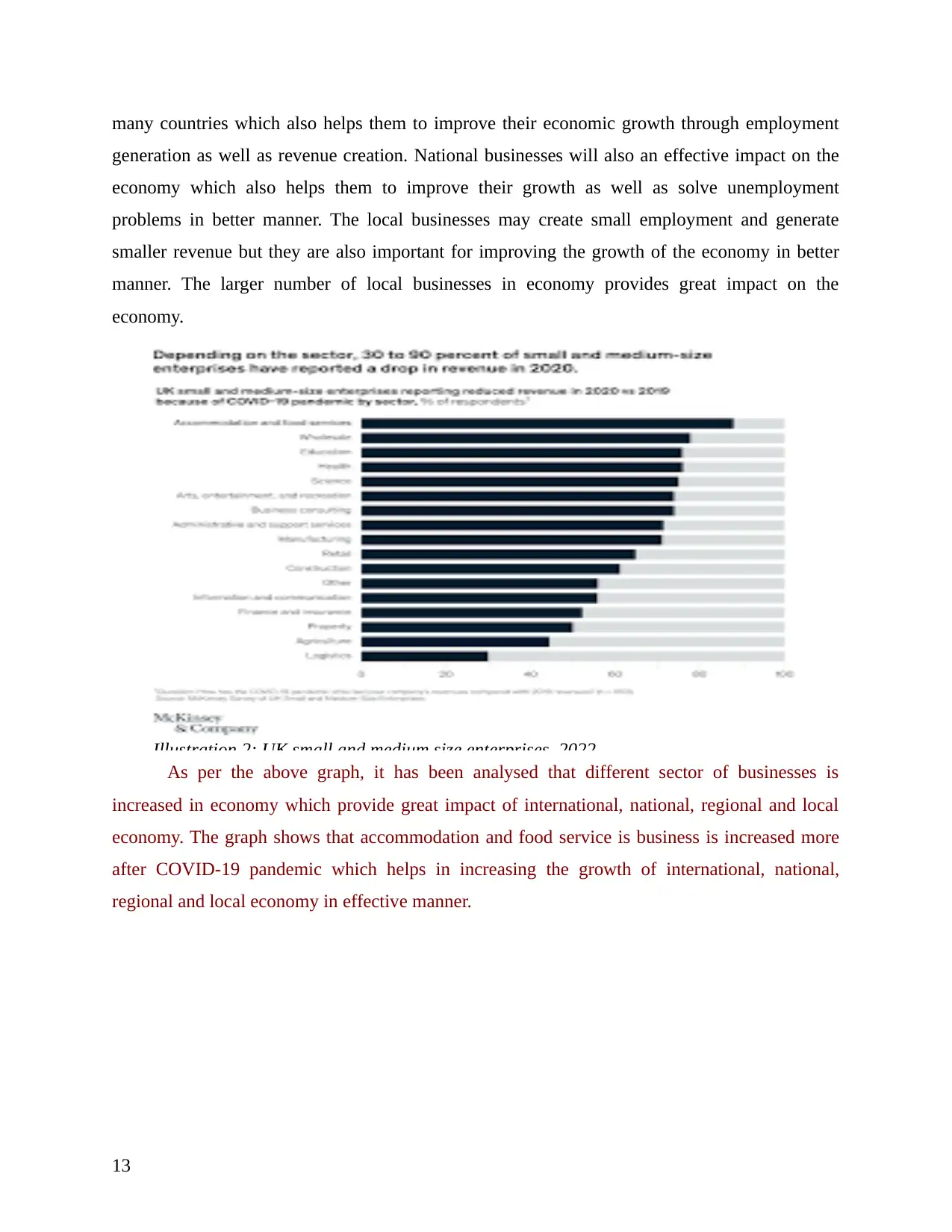
many countries which also helps them to improve their economic growth through employment
generation as well as revenue creation. National businesses will also an effective impact on the
economy which also helps them to improve their growth as well as solve unemployment
problems in better manner. The local businesses may create small employment and generate
smaller revenue but they are also important for improving the growth of the economy in better
manner. The larger number of local businesses in economy provides great impact on the
economy.
As per the above graph, it has been analysed that different sector of businesses is
increased in economy which provide great impact of international, national, regional and local
economy. The graph shows that accommodation and food service is business is increased more
after COVID-19 pandemic which helps in increasing the growth of international, national,
regional and local economy in effective manner.
13
Illustration 2: UK small and medium size enterprises, 2022
generation as well as revenue creation. National businesses will also an effective impact on the
economy which also helps them to improve their growth as well as solve unemployment
problems in better manner. The local businesses may create small employment and generate
smaller revenue but they are also important for improving the growth of the economy in better
manner. The larger number of local businesses in economy provides great impact on the
economy.
As per the above graph, it has been analysed that different sector of businesses is
increased in economy which provide great impact of international, national, regional and local
economy. The graph shows that accommodation and food service is business is increased more
after COVID-19 pandemic which helps in increasing the growth of international, national,
regional and local economy in effective manner.
13
Illustration 2: UK small and medium size enterprises, 2022
Paraphrase This Document
Need a fresh take? Get an instant paraphrase of this document with our AI Paraphraser
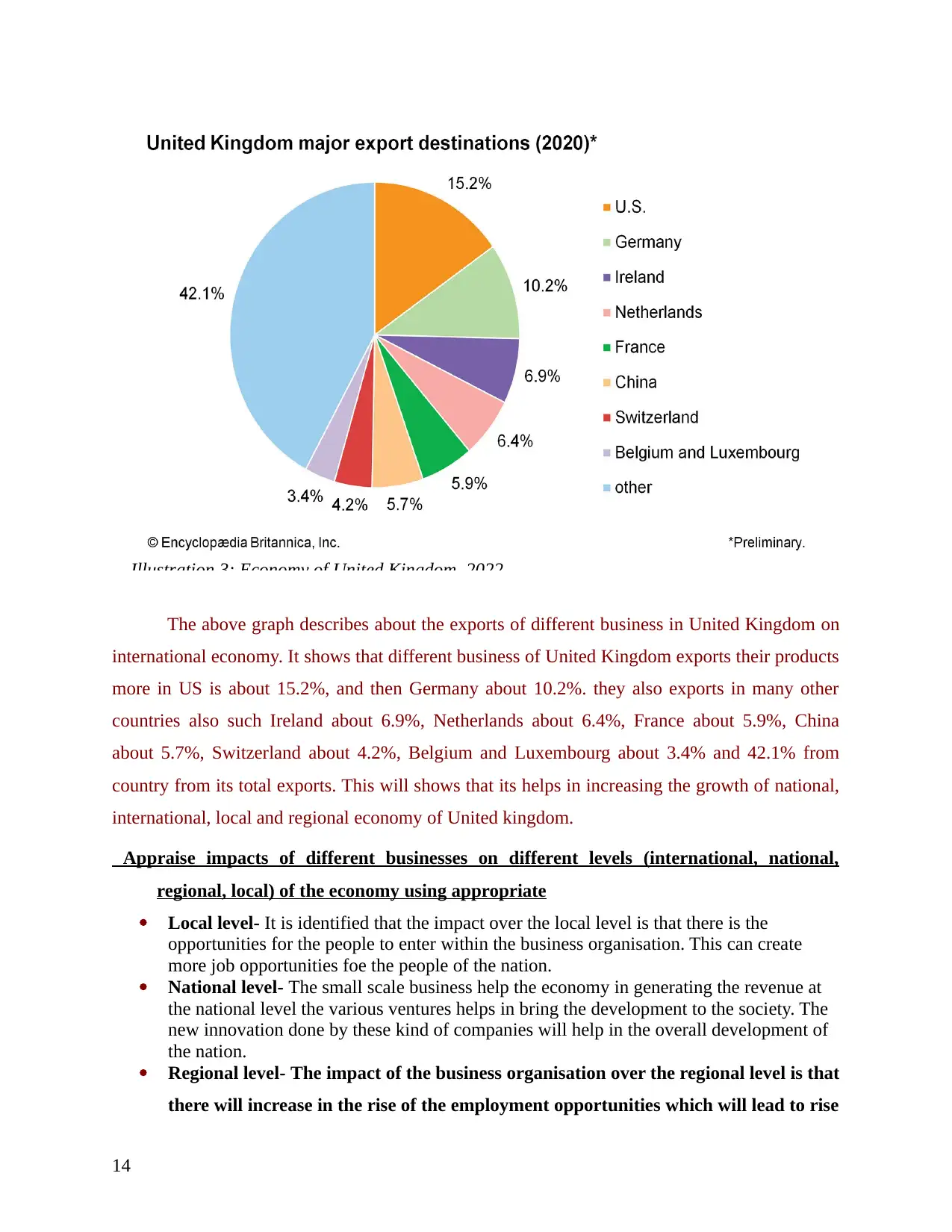
The above graph describes about the exports of different business in United Kingdom on
international economy. It shows that different business of United Kingdom exports their products
more in US is about 15.2%, and then Germany about 10.2%. they also exports in many other
countries also such Ireland about 6.9%, Netherlands about 6.4%, France about 5.9%, China
about 5.7%, Switzerland about 4.2%, Belgium and Luxembourg about 3.4% and 42.1% from
country from its total exports. This will shows that its helps in increasing the growth of national,
international, local and regional economy of United kingdom.
Appraise impacts of different businesses on different levels (international, national,
regional, local) of the economy using appropriate
Local level- It is identified that the impact over the local level is that there is the
opportunities for the people to enter within the business organisation. This can create
more job opportunities foe the people of the nation.
National level- The small scale business help the economy in generating the revenue at
the national level the various ventures helps in bring the development to the society. The
new innovation done by these kind of companies will help in the overall development of
the nation.
Regional level- The impact of the business organisation over the regional level is that
there will increase in the rise of the employment opportunities which will lead to rise
14
Illustration 3: Economy of United Kingdom, 2022
international economy. It shows that different business of United Kingdom exports their products
more in US is about 15.2%, and then Germany about 10.2%. they also exports in many other
countries also such Ireland about 6.9%, Netherlands about 6.4%, France about 5.9%, China
about 5.7%, Switzerland about 4.2%, Belgium and Luxembourg about 3.4% and 42.1% from
country from its total exports. This will shows that its helps in increasing the growth of national,
international, local and regional economy of United kingdom.
Appraise impacts of different businesses on different levels (international, national,
regional, local) of the economy using appropriate
Local level- It is identified that the impact over the local level is that there is the
opportunities for the people to enter within the business organisation. This can create
more job opportunities foe the people of the nation.
National level- The small scale business help the economy in generating the revenue at
the national level the various ventures helps in bring the development to the society. The
new innovation done by these kind of companies will help in the overall development of
the nation.
Regional level- The impact of the business organisation over the regional level is that
there will increase in the rise of the employment opportunities which will lead to rise
14
Illustration 3: Economy of United Kingdom, 2022
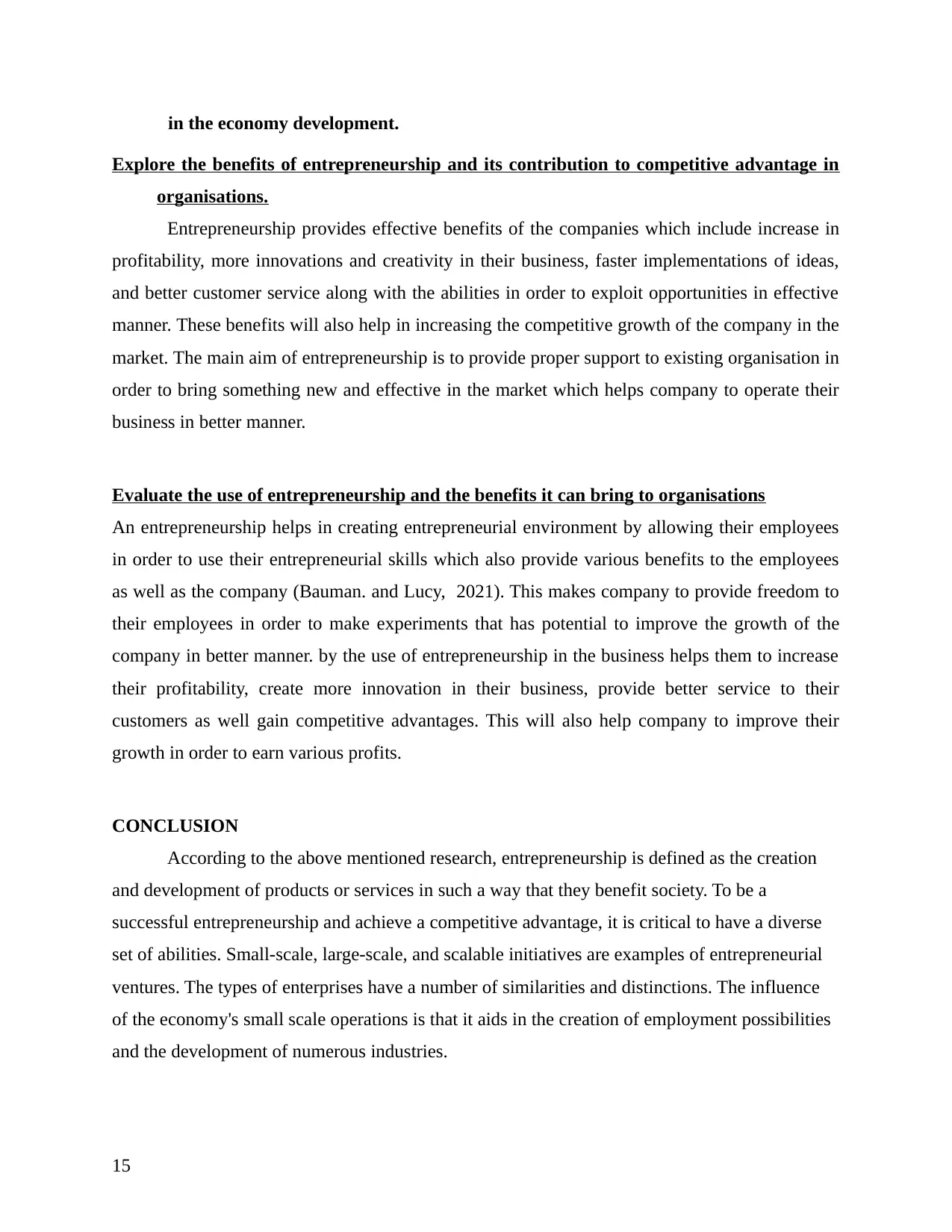
in the economy development.
Explore the benefits of entrepreneurship and its contribution to competitive advantage in
organisations.
Entrepreneurship provides effective benefits of the companies which include increase in
profitability, more innovations and creativity in their business, faster implementations of ideas,
and better customer service along with the abilities in order to exploit opportunities in effective
manner. These benefits will also help in increasing the competitive growth of the company in the
market. The main aim of entrepreneurship is to provide proper support to existing organisation in
order to bring something new and effective in the market which helps company to operate their
business in better manner.
Evaluate the use of entrepreneurship and the benefits it can bring to organisations
An entrepreneurship helps in creating entrepreneurial environment by allowing their employees
in order to use their entrepreneurial skills which also provide various benefits to the employees
as well as the company (Bauman. and Lucy, 2021). This makes company to provide freedom to
their employees in order to make experiments that has potential to improve the growth of the
company in better manner. by the use of entrepreneurship in the business helps them to increase
their profitability, create more innovation in their business, provide better service to their
customers as well gain competitive advantages. This will also help company to improve their
growth in order to earn various profits.
CONCLUSION
According to the above mentioned research, entrepreneurship is defined as the creation
and development of products or services in such a way that they benefit society. To be a
successful entrepreneurship and achieve a competitive advantage, it is critical to have a diverse
set of abilities. Small-scale, large-scale, and scalable initiatives are examples of entrepreneurial
ventures. The types of enterprises have a number of similarities and distinctions. The influence
of the economy's small scale operations is that it aids in the creation of employment possibilities
and the development of numerous industries.
15
Explore the benefits of entrepreneurship and its contribution to competitive advantage in
organisations.
Entrepreneurship provides effective benefits of the companies which include increase in
profitability, more innovations and creativity in their business, faster implementations of ideas,
and better customer service along with the abilities in order to exploit opportunities in effective
manner. These benefits will also help in increasing the competitive growth of the company in the
market. The main aim of entrepreneurship is to provide proper support to existing organisation in
order to bring something new and effective in the market which helps company to operate their
business in better manner.
Evaluate the use of entrepreneurship and the benefits it can bring to organisations
An entrepreneurship helps in creating entrepreneurial environment by allowing their employees
in order to use their entrepreneurial skills which also provide various benefits to the employees
as well as the company (Bauman. and Lucy, 2021). This makes company to provide freedom to
their employees in order to make experiments that has potential to improve the growth of the
company in better manner. by the use of entrepreneurship in the business helps them to increase
their profitability, create more innovation in their business, provide better service to their
customers as well gain competitive advantages. This will also help company to improve their
growth in order to earn various profits.
CONCLUSION
According to the above mentioned research, entrepreneurship is defined as the creation
and development of products or services in such a way that they benefit society. To be a
successful entrepreneurship and achieve a competitive advantage, it is critical to have a diverse
set of abilities. Small-scale, large-scale, and scalable initiatives are examples of entrepreneurial
ventures. The types of enterprises have a number of similarities and distinctions. The influence
of the economy's small scale operations is that it aids in the creation of employment possibilities
and the development of numerous industries.
15
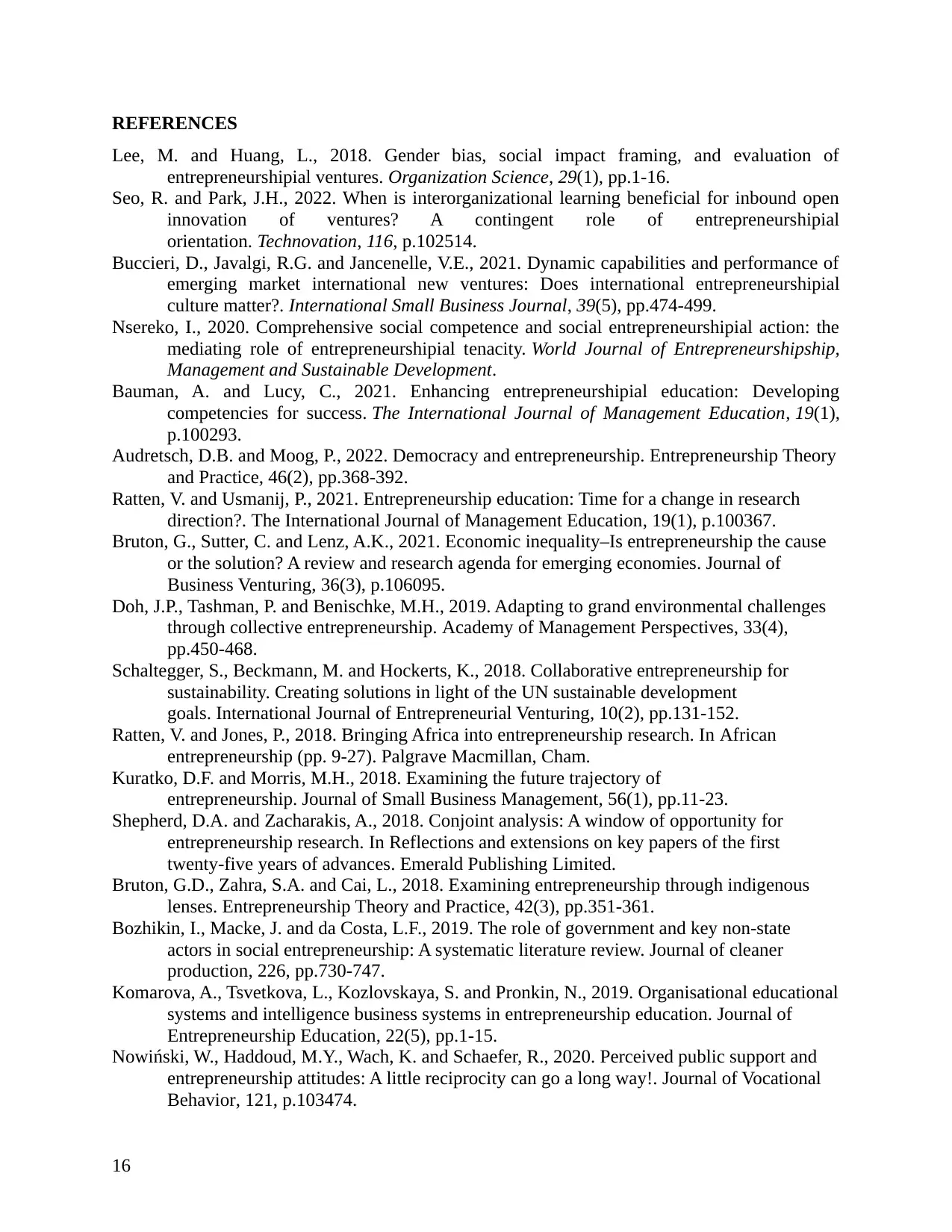
REFERENCES
Lee, M. and Huang, L., 2018. Gender bias, social impact framing, and evaluation of
entrepreneurshipial ventures. Organization Science, 29(1), pp.1-16.
Seo, R. and Park, J.H., 2022. When is interorganizational learning beneficial for inbound open
innovation of ventures? A contingent role of entrepreneurshipial
orientation. Technovation, 116, p.102514.
Buccieri, D., Javalgi, R.G. and Jancenelle, V.E., 2021. Dynamic capabilities and performance of
emerging market international new ventures: Does international entrepreneurshipial
culture matter?. International Small Business Journal, 39(5), pp.474-499.
Nsereko, I., 2020. Comprehensive social competence and social entrepreneurshipial action: the
mediating role of entrepreneurshipial tenacity. World Journal of Entrepreneurshipship,
Management and Sustainable Development.
Bauman, A. and Lucy, C., 2021. Enhancing entrepreneurshipial education: Developing
competencies for success. The International Journal of Management Education, 19(1),
p.100293.
Audretsch, D.B. and Moog, P., 2022. Democracy and entrepreneurship. Entrepreneurship Theory
and Practice, 46(2), pp.368-392.
Ratten, V. and Usmanij, P., 2021. Entrepreneurship education: Time for a change in research
direction?. The International Journal of Management Education, 19(1), p.100367.
Bruton, G., Sutter, C. and Lenz, A.K., 2021. Economic inequality–Is entrepreneurship the cause
or the solution? A review and research agenda for emerging economies. Journal of
Business Venturing, 36(3), p.106095.
Doh, J.P., Tashman, P. and Benischke, M.H., 2019. Adapting to grand environmental challenges
through collective entrepreneurship. Academy of Management Perspectives, 33(4),
pp.450-468.
Schaltegger, S., Beckmann, M. and Hockerts, K., 2018. Collaborative entrepreneurship for
sustainability. Creating solutions in light of the UN sustainable development
goals. International Journal of Entrepreneurial Venturing, 10(2), pp.131-152.
Ratten, V. and Jones, P., 2018. Bringing Africa into entrepreneurship research. In African
entrepreneurship (pp. 9-27). Palgrave Macmillan, Cham.
Kuratko, D.F. and Morris, M.H., 2018. Examining the future trajectory of
entrepreneurship. Journal of Small Business Management, 56(1), pp.11-23.
Shepherd, D.A. and Zacharakis, A., 2018. Conjoint analysis: A window of opportunity for
entrepreneurship research. In Reflections and extensions on key papers of the first
twenty-five years of advances. Emerald Publishing Limited.
Bruton, G.D., Zahra, S.A. and Cai, L., 2018. Examining entrepreneurship through indigenous
lenses. Entrepreneurship Theory and Practice, 42(3), pp.351-361.
Bozhikin, I., Macke, J. and da Costa, L.F., 2019. The role of government and key non-state
actors in social entrepreneurship: A systematic literature review. Journal of cleaner
production, 226, pp.730-747.
Komarova, A., Tsvetkova, L., Kozlovskaya, S. and Pronkin, N., 2019. Organisational educational
systems and intelligence business systems in entrepreneurship education. Journal of
Entrepreneurship Education, 22(5), pp.1-15.
Nowiński, W., Haddoud, M.Y., Wach, K. and Schaefer, R., 2020. Perceived public support and
entrepreneurship attitudes: A little reciprocity can go a long way!. Journal of Vocational
Behavior, 121, p.103474.
16
Lee, M. and Huang, L., 2018. Gender bias, social impact framing, and evaluation of
entrepreneurshipial ventures. Organization Science, 29(1), pp.1-16.
Seo, R. and Park, J.H., 2022. When is interorganizational learning beneficial for inbound open
innovation of ventures? A contingent role of entrepreneurshipial
orientation. Technovation, 116, p.102514.
Buccieri, D., Javalgi, R.G. and Jancenelle, V.E., 2021. Dynamic capabilities and performance of
emerging market international new ventures: Does international entrepreneurshipial
culture matter?. International Small Business Journal, 39(5), pp.474-499.
Nsereko, I., 2020. Comprehensive social competence and social entrepreneurshipial action: the
mediating role of entrepreneurshipial tenacity. World Journal of Entrepreneurshipship,
Management and Sustainable Development.
Bauman, A. and Lucy, C., 2021. Enhancing entrepreneurshipial education: Developing
competencies for success. The International Journal of Management Education, 19(1),
p.100293.
Audretsch, D.B. and Moog, P., 2022. Democracy and entrepreneurship. Entrepreneurship Theory
and Practice, 46(2), pp.368-392.
Ratten, V. and Usmanij, P., 2021. Entrepreneurship education: Time for a change in research
direction?. The International Journal of Management Education, 19(1), p.100367.
Bruton, G., Sutter, C. and Lenz, A.K., 2021. Economic inequality–Is entrepreneurship the cause
or the solution? A review and research agenda for emerging economies. Journal of
Business Venturing, 36(3), p.106095.
Doh, J.P., Tashman, P. and Benischke, M.H., 2019. Adapting to grand environmental challenges
through collective entrepreneurship. Academy of Management Perspectives, 33(4),
pp.450-468.
Schaltegger, S., Beckmann, M. and Hockerts, K., 2018. Collaborative entrepreneurship for
sustainability. Creating solutions in light of the UN sustainable development
goals. International Journal of Entrepreneurial Venturing, 10(2), pp.131-152.
Ratten, V. and Jones, P., 2018. Bringing Africa into entrepreneurship research. In African
entrepreneurship (pp. 9-27). Palgrave Macmillan, Cham.
Kuratko, D.F. and Morris, M.H., 2018. Examining the future trajectory of
entrepreneurship. Journal of Small Business Management, 56(1), pp.11-23.
Shepherd, D.A. and Zacharakis, A., 2018. Conjoint analysis: A window of opportunity for
entrepreneurship research. In Reflections and extensions on key papers of the first
twenty-five years of advances. Emerald Publishing Limited.
Bruton, G.D., Zahra, S.A. and Cai, L., 2018. Examining entrepreneurship through indigenous
lenses. Entrepreneurship Theory and Practice, 42(3), pp.351-361.
Bozhikin, I., Macke, J. and da Costa, L.F., 2019. The role of government and key non-state
actors in social entrepreneurship: A systematic literature review. Journal of cleaner
production, 226, pp.730-747.
Komarova, A., Tsvetkova, L., Kozlovskaya, S. and Pronkin, N., 2019. Organisational educational
systems and intelligence business systems in entrepreneurship education. Journal of
Entrepreneurship Education, 22(5), pp.1-15.
Nowiński, W., Haddoud, M.Y., Wach, K. and Schaefer, R., 2020. Perceived public support and
entrepreneurship attitudes: A little reciprocity can go a long way!. Journal of Vocational
Behavior, 121, p.103474.
16
Secure Best Marks with AI Grader
Need help grading? Try our AI Grader for instant feedback on your assignments.
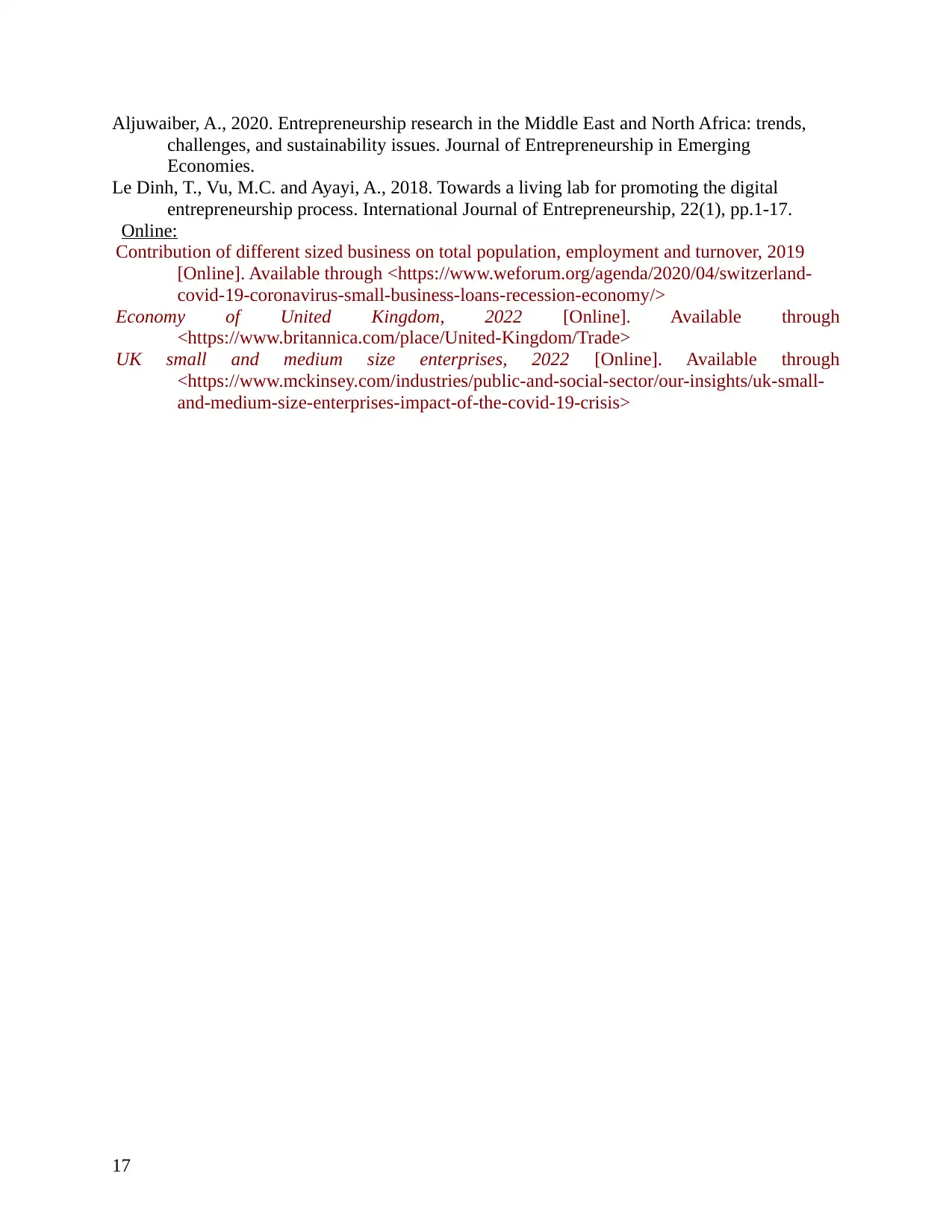
Aljuwaiber, A., 2020. Entrepreneurship research in the Middle East and North Africa: trends,
challenges, and sustainability issues. Journal of Entrepreneurship in Emerging
Economies.
Le Dinh, T., Vu, M.C. and Ayayi, A., 2018. Towards a living lab for promoting the digital
entrepreneurship process. International Journal of Entrepreneurship, 22(1), pp.1-17.
Online:
Contribution of different sized business on total population, employment and turnover, 2019
[Online]. Available through <https://www.weforum.org/agenda/2020/04/switzerland-
covid-19-coronavirus-small-business-loans-recession-economy/>
Economy of United Kingdom, 2022 [Online]. Available through
<https://www.britannica.com/place/United-Kingdom/Trade>
UK small and medium size enterprises, 2022 [Online]. Available through
<https://www.mckinsey.com/industries/public-and-social-sector/our-insights/uk-small-
and-medium-size-enterprises-impact-of-the-covid-19-crisis>
17
challenges, and sustainability issues. Journal of Entrepreneurship in Emerging
Economies.
Le Dinh, T., Vu, M.C. and Ayayi, A., 2018. Towards a living lab for promoting the digital
entrepreneurship process. International Journal of Entrepreneurship, 22(1), pp.1-17.
Online:
Contribution of different sized business on total population, employment and turnover, 2019
[Online]. Available through <https://www.weforum.org/agenda/2020/04/switzerland-
covid-19-coronavirus-small-business-loans-recession-economy/>
Economy of United Kingdom, 2022 [Online]. Available through
<https://www.britannica.com/place/United-Kingdom/Trade>
UK small and medium size enterprises, 2022 [Online]. Available through
<https://www.mckinsey.com/industries/public-and-social-sector/our-insights/uk-small-
and-medium-size-enterprises-impact-of-the-covid-19-crisis>
17
1 out of 17
Related Documents
Your All-in-One AI-Powered Toolkit for Academic Success.
+13062052269
info@desklib.com
Available 24*7 on WhatsApp / Email
![[object Object]](/_next/static/media/star-bottom.7253800d.svg)
Unlock your academic potential
© 2024 | Zucol Services PVT LTD | All rights reserved.



